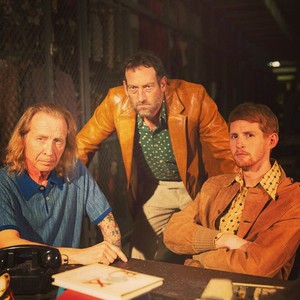
Paul Raci, Matthew Ryan Pest and Troy Kotsur in "American Buffalo" / Photo courtesy of Deaf West Theatre
“American Buffalo” is an example of what playwright and screenwriter David Mamet does best: lifting up the proverbial rock to inspect the lives, schemes — and especially language — of America’s shadier subcultures. Mamet’s characters unload a torrent of argot, regionalisms and vulgarisms that synthesize into the highly distinctive voices for which he is known. So how does Deaf West Theatre, a company that specializes in productions for the hearing impaired, cope with a play loaded with such linguistic hijinx? More importantly, how does the theatrical experience work for theatergoers that are not hard of hearing? Answer on both counts: very well! “American Buffalo” is presented by Deaf West Theatre and Cal State LA at the university’s State Playhouse through March 8.
Deaf West Theatre was founded in 1991 to enrich the lives of hearing impaired people in Southern California. To that end, they have been very successful, winning some 80 theater awards for artistic merit. Judging from the amount of signing I noticed among the audience, I’d estimate that about a third to half the attendees had hearing impairment. Deaf West is unquestionably a great resource for those in need of an enhanced experience. Yet, despite the amount of signing actually done by the characters, the play turned out to be a fairly seamless theatrical experience for Ameslan illiterates like myself.
Upon entering the theater, each audience member is lent a pair of cushy over-the-ear headphones, adjustable for size and volume. As the play begins, we see two of the three main characters, Donny and Bobby, inside Donny’s Chicago junk shop, debating the value of an old coin (an American buffalo nickel) recently sold to a customer. Since the two were speaking to each other normally, I wasn’t quite sure what the headphones were for until the other main character, Teach, enters.
Immediately, the actor communications switched to sign language and the spoken words of the script began to be broadcast through the headphones (by different offstage actors). Because the audio quality is very good, the experience is not off-putting at all and you experience none of the dreaded cognitive dissonance. Indeed, I found it as amusing as the hard of hearing obviously did to watch the actors using a variety of manic and colorful gestures to translate Mamet’s words. And I have to say that many of the gestures were so vivid that they needed no translation at all! And if you missed anything, there are also supertitles that run along the ceiling of the shop. Kind of like watching a foreign language opera, minus the music and the supercilious aristos.
Donny, played by Paul Raci, had his Chicago working-class accent down pretty well and made a convincing Polish junk shop owner — he reminded me of a white version of the popular 1970s TV character Fred Sanford from “Sanford & Son,” although less funny. However, I felt the character of young Bobby, played by Cal State LA MFA candidate Matthew Ryan Pest, was too clean cut — like a naïve, fresh-faced farm boy — for the fledgling lowlife he was supposedly playing. Best was Troy Kotsur as Teach, Donny’s brash, menacing poker buddy who worms his way into a scheme to rip off the customer with the buffalo nickel. His vigor, one could even say athleticism, in his signing and gesturing was hilarious and had the audience roaring. I got the distinct feeling a lot of the signing was, by necessity, improvisational and not what you would find in any book of American Sign Language.
A Mamet play is often an adventure of sorts, and this one was enhanced in a special way by the Deaf West players under the direction of Stephen Rothman. It has been said that Al Pacino starred in the definitive theatrical version of “American Buffalo” in New York in 1983 (the play premiered in 1975). But this production shows that the mix of spoken language with the ramped up physicality of the sign language adds a dimension that enhances and remains in resolute service to the work and the intentions of its creator.
—David Maurer, Culture Spot LA
“American Buffalo” continues through March 8 at the State Playhouse located at 5151 State University Drive, LA 90032 (on the campus of Cal State LA), with performances on Thursdays, Fridays and Saturdays at 7:30 p.m. (please note early curtain time) and Sundays at 2 p.m. For reservations and information, call (818) 762-2998 or visit www.deafwest.org. Recommended for mature audiences.





